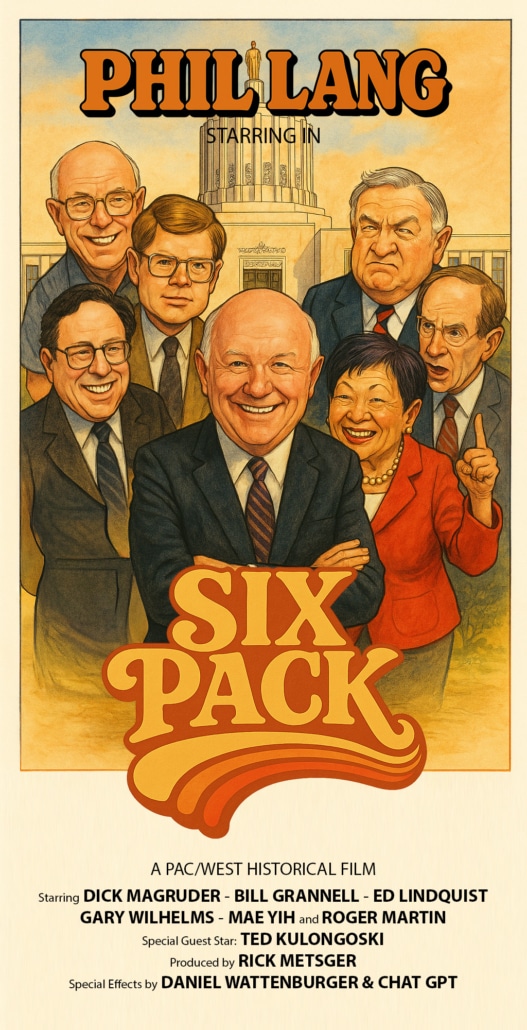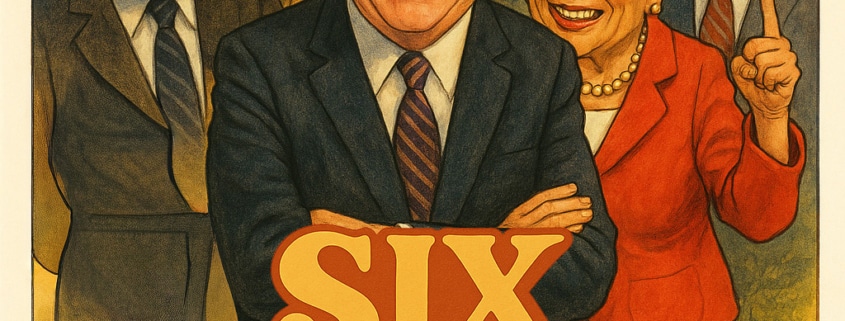‘Six Pack’ Pulls Off Legendary Legislative Coup in ’77
Bipartisan coalition takes everything but the gavel from House Speaker
“This is nothing but a bloodless coup by a coalition government.”
– Rep. Vera Katz
May 3, 1977
Light a match under a log and nothing is likely to happen. Separate a few splinters and light the match and the whole log might burst ablaze. When those splinters are legislators, the minority of the majority can yield immense power. Nearly a half century ago, in 1977, the BTU’s were unleashed in the Oregon House of Representatives by a small group of merry political bandits known as “The Six Pack.”
 The opening of the 1977 Oregon Legislative Session mirrored all the political elements of today. Democrats held the Governor’s mansion with Bob Straub; Democrats controlled the House and had an overwhelming 24-6 super-super majority in the Senate. In the House, Portland metro liberals controlled the leadership, the agenda, and most of the committees.
The opening of the 1977 Oregon Legislative Session mirrored all the political elements of today. Democrats held the Governor’s mansion with Bob Straub; Democrats controlled the House and had an overwhelming 24-6 super-super majority in the Senate. In the House, Portland metro liberals controlled the leadership, the agenda, and most of the committees.
Phil Lang, a knowledgeable, steady, and congenial insurance broker from Portland, held the Speaker’s gavel for the second consecutive session. The initial two months were unremarkable, but soon thereafter things started to change.
“There was a lot of funny stuff in the air,” recalled Rep. Rick Gustafson, who represented a swath of East Multnomah County.
Humor provided the first defense against a growing uneasiness in the chamber. A freshman legislator from Junction City, Ted Kulongoski, did his part. He introduced and carried to the floor a bill to declare that Sasquatch was real and to establish penalties for those convicted of harassing any Bigfoot in the state. As he was providing his commentary on the floor, a tall, furry creature appeared to sit next to him. Laughter filled the chamber. Inside the gnarly fur was a legislative intern by the name of Randy Leonard. The bill passed easily in the House, but the Senate was not amused and it never became law.
Rep. Curt Wolfer authored a bill to declare a particular beetle as the “official state bug.” A group of second grade students in his district had developed the idea and he was unrelenting in his desire to get it passed. The committee where the bill was languishing decided it had had enough. They would pass the bill, but only with a slight amendment. The beetle would be changed to Volkswagen, making it the state bug. The bill was withdrawn.
The tone of the session quickly spiraled out of control. When Rep. Dick Magruder of Clatskanie brought the carcasses of dead sheep to the Legislature to demand action to prevent attacks by coyotes, his fellow Democrat, Rep. Drew Davis of Portland, responded by bringing his pet coyote to the Capitol.
Rep. Wally Priestly, one of the most colorful characters in the House, grew increasingly upset about what he felt was neglect by the Legislature to rein in abuse that he believed was going on in the state prisons. He drafted a bill to require that all the locks on prisoner cells be removed from the outside and put on the inside, giving prisoners the keys.
Priestly was passionate about his beliefs. “One time he was so upset with what Republican Rep. Mary Rieke was saying on the floor that he angrily rose and told her she better stop,” Gustafson said. The Portland Democrat was already infamous for his confrontations with fellow Democrat Rep. Grace Peck, a staunch Catholic who opposed abortion. When Priestly lashed out for her comments, Peck replied: “I would consider abortion only if we made it retroactive to you, Representative Priestly.”
“There were all sorts of angry exchanges,” Gustafson said. “We were all threatened.”
“Things were falling apart, nothing was getting done,” recalled Gary Wilhelms who served as Republican Whip during the session.
The late Roger Martin, the Republican Leader that year, was more blunt in his oral history interview for the Oregon Capitol Foundation.
“We had to find a way to get done and get out of there and the Speaker (Lang) had fallen in love. He was so occupied falling in love that he just lost all control of time or getting anything done.”
Gustafson was more diplomatic, simply saying: “The Speaker grew increasingly distant.”
– – –
At a social gathering midway through session, Reps. Dick Magruder and Bill Grannell, both Democrats, approached Martin and Wilhelms. That initial entrée led to the formation of the “Six Pack,” four Democrats and two Republicans. The initial members were Gary Wilhelms, Roger Martin, Dick Magruder, Bill Grannell, Ted Kulongoski and Ed Lindquist, who was the House Majority leader. The membership would morph over the next few weeks.
At first they discussed overthrowing Lang and selecting a new Speaker. The idea was quickly dismissed as both sides felt that could create more chaos. Besides, they liked Lang and felt he was probably as frustrated by the liberal members of his caucus as they were.
The decision was made to keep Lang on the podium with the gavel but to strip him of most of his powers. Those powers would be conveyed to the Six Pack, which would establish their own Rules Committee. All bill referrals would be handled by the Pack, as would committee assignments and appointments of any conferees.
By the time they were about to make the motion to spring new rules on the floor, Wilhelms was beyond nervous. “One of our Republicans said they were changing their vote, and our margin was already very slim.”
Wilhelms had broken out in a red, itchy rash all over his abdomen. He went to see the Legislature’s nurse (they actually had one back in the day) and she asked if he had been under stress lately. “Well, sir, because what you have is a breakout of hives,” she diagnosed.
It was May 3, 1977, and the day’s session was about to convene. Just before the opening gavel Wilhelms approached Speaker Lang and told him what they were going to do. “I wanted him to hear it from me,” said Wilhelms. “I wanted him to know it wasn’t personal, it was just business.”
The vote passed 32-28. Perhaps feeling the outrage from their Portland liberal members, Lindquist and Kulongoski both voted “No.” The die, however, had been cast as a number of rural and suburban Democrats — Mae Yih, Jeff Gilmore, Max Rijken and Bud Byers — were among those who had joined the cause and supported the rules change. The Six Pack was now in charge of the session.
In an interview a few years ago with the Oregon Capitol Foundation, Lang, who passed away in 2024, said he had thought about resigning. “I even wrote a letter of resignation and delivered it to the Secretary of State’s office. But I decided to withdraw it,” Lang said.
There was outrage among some of the Democratic caucus that their own Majority Leader had been one of the early plotters. Lindquist offered a different perspective.
“I told them I was just trying to meet with some of our unhappy members and see what I could do to bring everyone back together.”
The following day the headline in The Statesman-Journal read: “Most of Speaker’s powers stripped from Lang.”
“It was a Humpty-Dumpty type atmosphere,” wrote reporter Ron Blankenbaker. “House Speaker Phil Lang was left with his gavel and practically nothing to bang it about.”
“This is nothing more than a bloodless coup by a coalition government,” exclaimed Rep. Vera Katz.
It marked a turning point and, by most accounts, the session finished smoothly and with whirlwind passage of historic legislation. They overhauled the state’s workers’ compensation system, protected coastal areas, became the first state to ban ozone-depleting aerosol cans, and reformed timberland taxes by replacing property tax with a severance tax upon harvest of the timber. The House also established the nation’s first regional government, Metro.
Even Lang acknowledged the magnitude of the accomplishments.
“We had a very successful session regardless of all that,” he said in his 2019 interview.
On July 5, 1977, the gavel fell for the last time on the 59th Legislative Assembly. There would be plenty of change before they would meet again. The Six Pack would be gone. But there was a new buzz circling the Capitol. A hornet’s nest was forming, and those hornets were preparing to sting.
‘The Hornets” is Part 2 of this Pac/West Historical Feature. Stay tuned …



